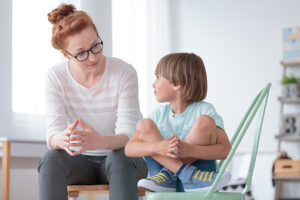It’s Children’s Mental Health Week in the UK (5th-11th February 2024) and the theme for this year is ‘My Voice Matters’, as new data shows young people face barriers when seeking mental health support.
 Children’s Mental Health Week was founded in 2015 by the charity Place2Be. Now in its tenth year, the national awareness campaign is supported by hundreds of schools, parents, carers and children each year.
Children’s Mental Health Week was founded in 2015 by the charity Place2Be. Now in its tenth year, the national awareness campaign is supported by hundreds of schools, parents, carers and children each year.
The awareness week is designed to empower and equip, and aims to give a voice to all children and young people in the UK.
Breaking down the barriers for Children’s Mental Health Week
 It comes as new data released by Place2Be reveals that 55% of young people report facing barriers in seeking mental health support.
It comes as new data released by Place2Be reveals that 55% of young people report facing barriers in seeking mental health support.
Place2Be commissioned YouGov to conduct a survey of 1,045 8-16 year-olds and also held a series of focus groups. They asked children and young people in the UK to share their views and experiences of mental health influences, expressing emotion, any barriers to seeking support, and feeling heard by adults.
Over half (55%) of those surveyed said that something would stop them from asking for help when they were struggling with their feelings. These barriers included:
- Feeling uncomfortable speaking to someone they do not know (29%)
- Wanting their struggles to remain a secret (19%)
- Being scared about their friends’ reactions (20%)
- Being concerned about their families’ response (16%)
Only around 1 in 3 respondents (34%) said that nothing would stop them from seeking support.
Children and young people spoke about feeling embarrassed and not wanting to concern others. Many also said they struggled to articulate their feelings and some were worried about being a nuisance to the adults around them or about how people would react.
Listen and act this Children’s Mental Health Week
 When asked what they were worried about, the majority of children (almost 60%) cited school work and exams, while 45% were concerned about their physical appearance and 42% said climate change.
When asked what they were worried about, the majority of children (almost 60%) cited school work and exams, while 45% were concerned about their physical appearance and 42% said climate change.
Almost 4 in 10 also said they were worried about their family not having enough money amid the ongoing cost-of-living crisis.
The CEO of Place2Be, Catherine Roche, described the children’s comments as “powerful.”
She said:
“Thousands of children are struggling with their mental health, so this Children’s Mental Health Week we call on everyone to listen to what they’re saying, and act on it.
“At Place2Be, we know from delivering services in schools for 30 years that providing children with a safe place to be themselves gives them the skills to manage their emotional challenges. Having a space where they can talk in confidence with a trusted, trained mental health professional helps them to feel connected and more likely to stay in education.”
Children’s Mental Health Week gives schools vital ‘tools’
 Ms Roche voiced concerns that thousands of children still lack access to dedicated mental health support in schools, and said that more funding was needed to improve the system.
Ms Roche voiced concerns that thousands of children still lack access to dedicated mental health support in schools, and said that more funding was needed to improve the system.
She added:
“Long-term investment in this preventative work is a crucial investment in our next generation. It’s cost-effective and changes lives. We must work together, across sectors, to make this happen.”
Throughout Children’s Mental Health Week, schools across the UK will be taking part in activities and discussions, which can be done inside and outside the classroom.
Place2Be provide a range of free resources on their website to support schools, youth groups and families to take part and raise vital funds and awareness for Children’s Mental Health Week.
Resources available include video activities, top tips in partnership with Beano, a BAFTA video series featuring well-known stars such as Alex Scott and Gwendoline Christie and the Sesame Workshop video featuring beloved Sesame Street character Elmo.
There’s also a special ‘Express Yourself’ non-uniform day planned on Friday 9th January for all schools who want to participate and raise funds for Place2Be.
Supporting schools to raise awareness, start conversations and address mental health problems in children and young people is central to Place2Be’s mission.
Their Principal Educational Psychologist, Dr Julia Clements, explained:
“Teachers must be given the tools they need to listen to pupils and refer to counsellors when necessary. Parents and carers are absolutely key too. Conversations about how your child is feeling needn’t be scary – even a few minutes every day asking them how they are, providing a listening ear and words of support and encouragement can make a big difference to your child’s wellbeing.
“There is advice on our website for anyone supporting children, but of course if you are very concerned, please do seek out additional support.”
We must work together for children’s mental health
 Meanwhile, the Children’s Commissioner for England, Dame Rachel de Souza, talked about how important it was for children and young people to have good mental health and wellbeing and said she was “extremely concerned” about their mental health, citing NHS statistics which indicate that as many as 1 in 5 children has a diagnosable mental health disorder.
Meanwhile, the Children’s Commissioner for England, Dame Rachel de Souza, talked about how important it was for children and young people to have good mental health and wellbeing and said she was “extremely concerned” about their mental health, citing NHS statistics which indicate that as many as 1 in 5 children has a diagnosable mental health disorder.
She added:
“In Children’s Mental Health Week, it is really important that we all stop and listen to what children are telling us about their wants, needs and concerns when it comes to their mental health so we can tackle the issue before it gets even more serious.
“Children often tell me issues with their mental health act as a significant barrier to their overall success, so we all have a role to play in supporting and helping to improve children’s mental health. Only when we all work together will we see meaningful change that will help transform the lives of young people.”
Learning to support children and young people
 First Response Training (FRT) is a leading national training provider delivering courses in subjects such as health and safety, first aid, fire safety, manual handling, food safety, mental health, health and social care, safeguarding and more.
First Response Training (FRT) is a leading national training provider delivering courses in subjects such as health and safety, first aid, fire safety, manual handling, food safety, mental health, health and social care, safeguarding and more.
They work with a large number of early years and childcare providers, as well as schools, colleges, and children’s services.
Their courses include Understanding Mental Health, Youth Mental Health First Aid, Anxiety Awareness, Self-Harm Awareness and Suicide Awareness.
A trainer from FRT says:
“It’s vitally important that we keep talking openly about mental health and that we take the time to have conversations with children and young people and really listen to what they’ve got to say about their thoughts, feelings and worries, to support their wellbeing and check in with them.
“It’s also really important for anyone who works closely with children and young people to have a good understanding of mental health and be able to spot the signs that someone may be struggling. They should also feel confident to offer appropriate early help and support. Focused training can help with this.”
For more information on the training that FRT can provide, please call them today on freephone 0800 310 2300 or send an e-mail to info@firstresponsetraining.com.
